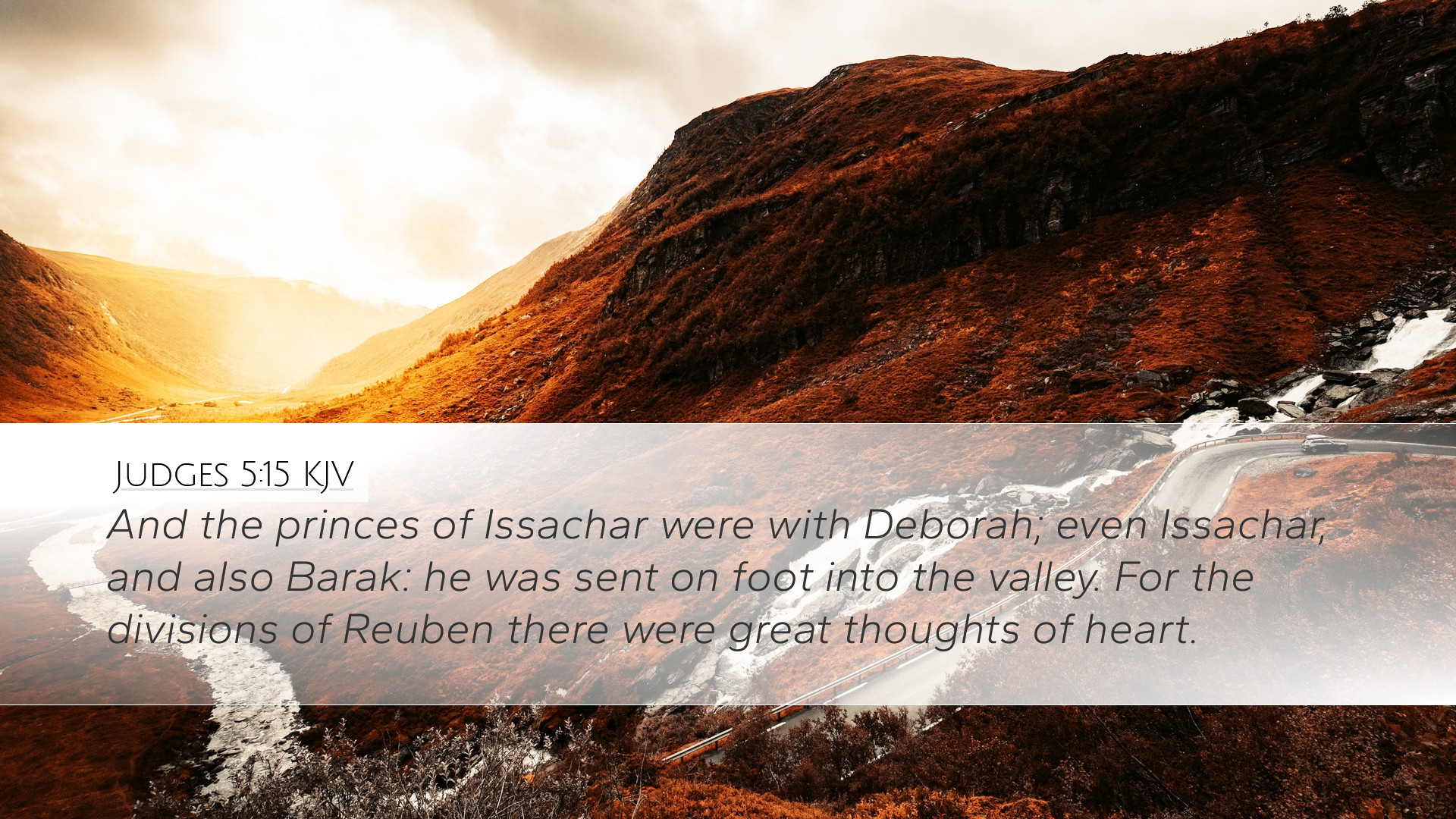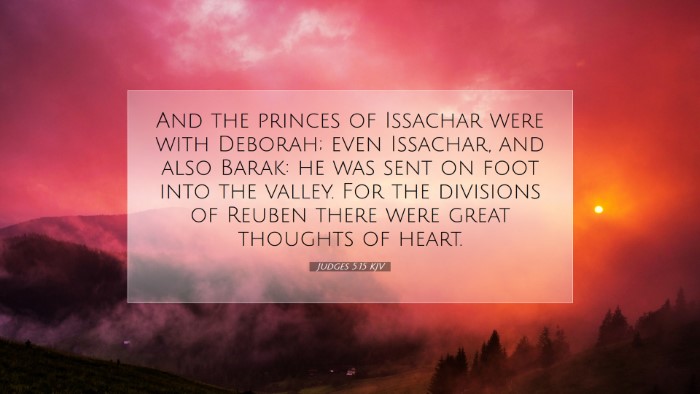Commentary on Judges 5:15
Bible Verse: Judges 5:15 - "And the princes of Issachar were with Deborah; even Issachar, and also Barak; he was sent on foot into the valley; for the divisions of Reuben there were great thoughts of heart."
Introduction
The verse comes from the Song of Deborah, which celebrates the deliverance of Israel from the oppression of Jabin, king of Canaan, and his commander Sisera. This verse highlights the roles of the tribes during this tumultuous period in Israel’s history, specifically mentioning the tribe of Issachar, indicating their support and courage in the battle against their oppressors.
Insights from Commentaries
Matthew Henry's Commentary
Matthew Henry points out the commendable support of the tribe of Issachar, who allied themselves with Deborah, the prophetess and judge of Israel. This highlights the importance of leadership in the community. The tribes that aligned with Deborah demonstrated a willingness to follow her divinely inspired call to battle. He emphasizes the role of wise counsel and collaboration in divine missions, noting how unity among the tribes was critical in overcoming their enemies.
Albert Barnes' Commentary
Albert Barnes elaborates on the strategic significance of Issachar. He notes that this tribe was known for its understanding of the times (1 Chronicles 12:32) and emphasizes that their participation reflects a deeper awareness of the divine plan at work. Their readiness to join, even without waiting for a more prominent call, showcases a profound commitment to God’s purpose. Barnes underlines the symbolism of 'being sent on foot into the valley,' stressing the willingness to engage in battle despite the inherent risks and dangers associated with such endeavors.
Adam Clarke's Commentary
Adam Clarke provides a historical context to the actions of the tribes mentioned. He remarks on Reuben's reluctance and the 'great thoughts of heart' that did not translate into action, contrasting it with Issachar's proactive approach alongside Barak and Deborah. Clarke illustrates the importance of not just having good intentions but also the necessity of acting upon them—a lesson that remains relevant for believers today. He highlights the faith embodied by Issachar’s leaders, indicating that true faith often requires stepping out into the unknown.
Theological Reflections
The scholarly interpretations of this verse serve to remind contemporary readers of the critical themes of responsibility and action in faith. The praise of Issachar serves as an encouragement to the modern church to engage actively in God’s purposes, advocating that spiritual insight must catalyze real-world action.
Leadership and Unity
These commentaries collectively emphasize the necessity of strong, God-fearing leadership and the strength that comes from unity. The alliance between Deborah and the leaders of Issachar and Barak provides a model for church leadership today. The collaborative effort shown invites church leaders to foster relationships that promote unity in mission and purpose.
The Importance of Preparedness
Issachar's reputation for understanding the times highlights the call for vigilance and discernment in the church. Believers are urged to be aware of the spiritual and cultural contexts they operate within, preparing themselves to engage effectively with the world and to respond to God’s calling.
Action over Intention
Drawing on Clarke's insight regarding Reuben, the imperative to act on one’s convictions becomes clear. While good thoughts and intentions are commendable, they must be followed by action. This translates into a challenge for modern Christians to put their faith into practice, taking tangible steps in obedience to God's call.
Conclusion
Judges 5:15 serves as a profound reminder of community, leadership, preparedness, and action within the framework of faith. The commentaries by Henry, Barnes, and Clarke weave together insights that encourage today’s believers to rise up like the men of Issachar—wise, united in purpose, and willing to step forward into the fray for the cause of righteousness. This passage not just narrates a historical event but also echoes in the hearts of believers, urging them towards collective action for the kingdom of God.


